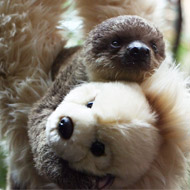
Enables youngster to strengthen his limbs
A zookeeper at London Zoo is helping to raise a baby sloth with the aid of a very special teddy bear.
Seven-week-old Edward, who was born to second-time parents Marilyn and Leander, needed a helping hand when his mum stopped producing milk and was unable to care for her infant.
To help him build up the muscles that he would normally use to cling onto his mother, zookeeper Kelly-Anne customised a sloth-teddy with carabiners so that it could be hung from a branch, enabling the youngster to climb on and strengthen his limbs.
Kelly-Anne also bottle-feeds Edward every three hours with goat's milk - far from being an easy task, given that sloths are nocturnal mammals and are notoriously slow! Kelly-Anne says that she often has to wait for Edward to stir from a deep slumber before she can feed him.
"If he's feeling particularly hungry he makes a very funny noise to let us know," says Kelly-Anne. "A sound somewhere between a squeak and a sneeze, but it's very loud and he makes his point!"
Kelly-Anne keeps detailed records on everything the infant does, from eating to sleeping and even his toilet habits! Sloths only leave their high tree-top habitats once a week to go to the toilet, so by keeping track of how much he goes, keepers can account for any weight loss or gains.
London Zoo say that Edward is a valuable addition to the European breeding programme for his species. His details will be added to the international studbook, which is shared with zoos around the world.
Image (C) ZSL London Zoo



 FIVP has shared a survey, inviting those working in independent practice to share their views on the CMA's proposed remedies.
FIVP has shared a survey, inviting those working in independent practice to share their views on the CMA's proposed remedies.